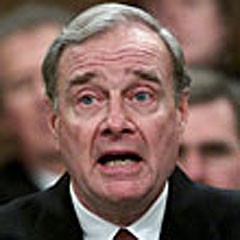
Watching Paul Martin's orgy of spending promises last week, ($10 billion in as many days) I couldn't resist the image of him rummaging through the waste paper basket he'd used for such policy proposals when he was finance minister. Certainly, Mr. Martin steadfastly ignored these, and virtually all other funding requests, year after year after year. And having proven so convincingly that he is incapable of developing a national vision of his own, the only way he could manage such a list is to go back to the garbage dump where he first threw them.
Now those with a poor memory - or a short one - might complain that Paul Martin only rejected those spending requests and demands because he spent his whole life as finance minister fighting the deficit monster. Not quite. In fact, no finance minister in Canadian history had ever been blessed with so many large and uninterrupted surpluses: seven to be exact, between 1997 and 2003 when he lost his job. And the Liberals have added two more surpluses to the list since then.
No, it wasn't for lack of money that Mr. Martin didn't spend. It was because he didn't want to. In fact, he was so determined not to spend, he deliberately low-balled estimates of every one of those surpluses.
Making Mulroney look generous
Paul Martin embraced Bay Street's "smaller government" mantra with even more enthusiasm than his corporate-sycophant predecessor, Brian Mulroney. Mulroney gleefully signed the free-trade agreement, forever changing Canada's future, but one often got the feeling that he was actually cutting spending reluctantly, a reflection of his previous attachment to Red Toryism.
There was no such hesitation with Paul Martin, especially once he got his walking papers from Tom d'Aquino of the (then) Business Council on National Issues. In mid-1994, d'Aquino presented the new finance minister with a 10-point program for "restructuring" the country. Martin's enthusiasm for delivering on this corporate wish list was made apparent in his 1995 budget speech.
While Martin's budget has gone down in history as the "deficit slaying" budget, this is not how Martin himself described it in the House of Commons on February 27, 1995. He proclaimed that he intended to "redesign the very role and structure of government itself. Indeed, as far as we are concerned, it is … the very redefinition of government itself that is the main achievement of this budget.… This budget overhauls what government does." Announcing over $25 billion in spending cuts over three years, he boasted: "Relative to the size of our economy, program spending will be lower in 1996-97 than at any time since 1951."
The deficit was gone in two years. If Martin had simply frozen spending, the deficit would have disappeared just two years after that.
Legislation demolition
And it wasn't just the cuts. It was also the dismantling of one of the most important pieces of nation-building legislation in the land. When Martin repealed the Established Program Funding (EPF) legislation, he deliberately eliminated one of the two key laws defining Medicare (the other is the Canada Health Act). The EPF obliged provinces to spend federal monies on Medicare and post-secondary education or they didn't get the money. Once the EPF was gone, Medicare began to balkanize into ten systems and the privatization of services began in earnest.
In slashing Medicare funding and eliminating the EPF, Martin created what neocon strategists call a "useful crisis," weaknesses in the system that critics can use to promote for-profit as the solution. The evidence that the "crisis" was deliberate is irrefutable. Mr. Martin could have easily reversed the cuts if he had chosen to. Between the years 1999 and 2002, Martin, again deliberately, underestimated the accumulated surpluses by over $36 billion. I say deliberately because others were consistently making more accurate estimates, including the Canadian Centre for Policy Alternatives whose estimates were out by less than one billion.
The surpluses were so enormous that by 2000, Martin could no longer simply hide them. So he cut taxes by $100-billion over five years (77 percent of the personal benefits going to the wealthiest 8 percent of the population). Billions also went to Canada's largest corporations. Paul Martin gained the reputation as someone who dealt decisively with the deficit crisis. But that lasted just three years of his term. He should be known as the man who solved the surplus crisis, because for a politician who wants to take government programs back to 1951 levels, a chronic surplus really is a crisis.
Blame Jack
The only reason that Paul Martin has increased spending at all since the 2004 election, is that by virtue of a Canadian populace tired of "smaller government," he is in a minority situation. And he can tell a bitterly disappointed Bay Street that "Jack Layton made me do it."
Now, Martin promises to spend billions more on everything from First Nations to the arts - if we re-elect him. From a man who systematically disabled our national government, this is grotesquely hypocritical and a transparent grasping for power. Is Paul Martin a politician whose promises can be trusted? Think 1993 Liberal Red Book: The infamous book of lies and broken promises. It was co-authored by...wait for it. Paul Martin.
Murray Dobbin's 'State of the Nation' column appears twice monthly on The Tyee. ![]()















Tyee Commenting Guidelines
Comments that violate guidelines risk being deleted, and violations may result in a temporary or permanent user ban. Maintain the spirit of good conversation to stay in the discussion.
*Please note The Tyee is not a forum for spreading misinformation about COVID-19, denying its existence or minimizing its risk to public health.
Do:
Do not: